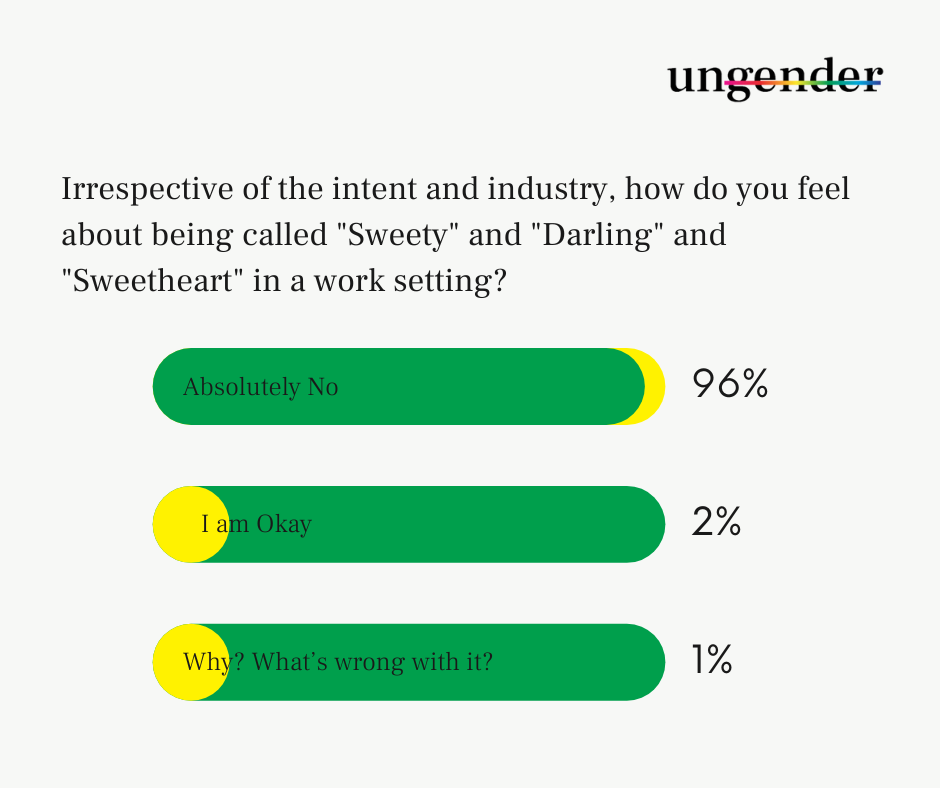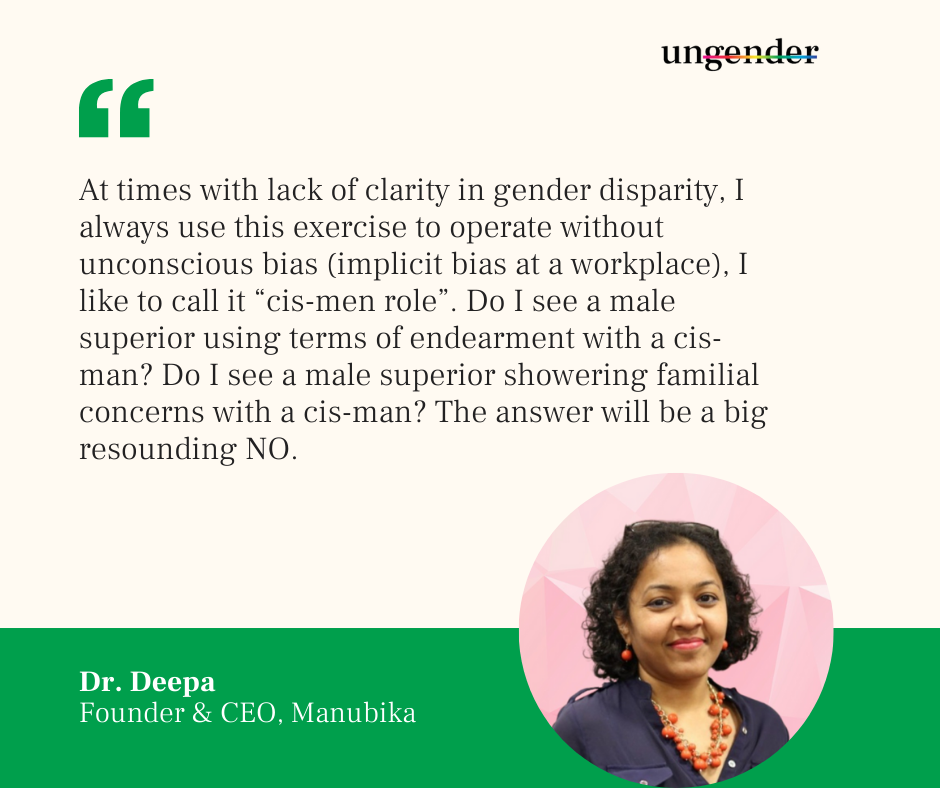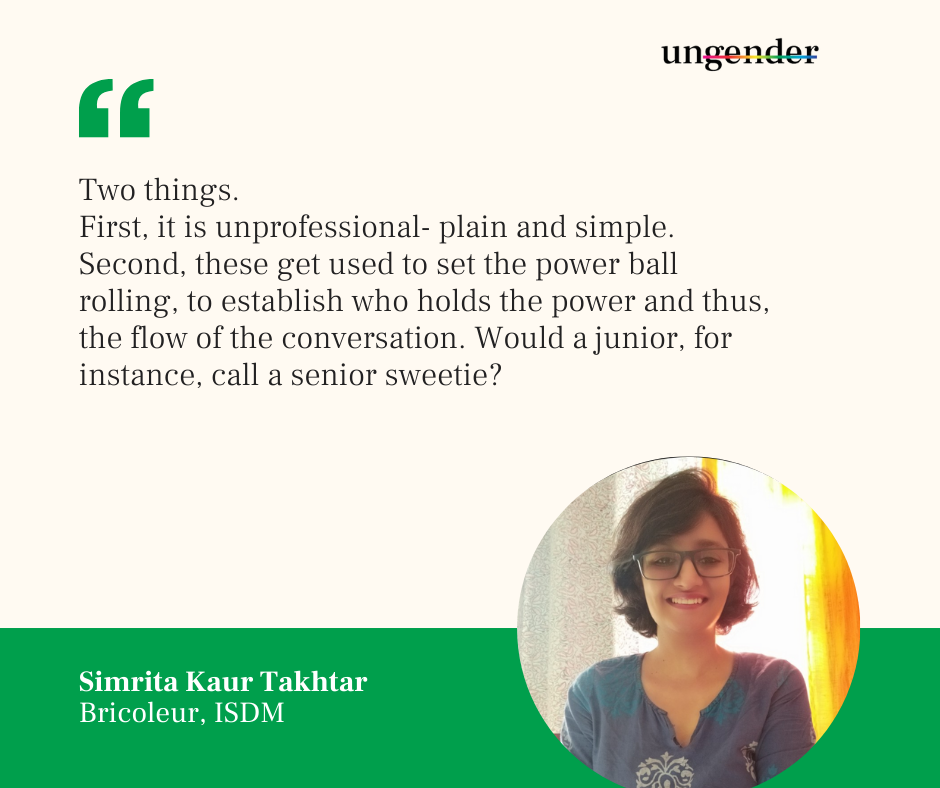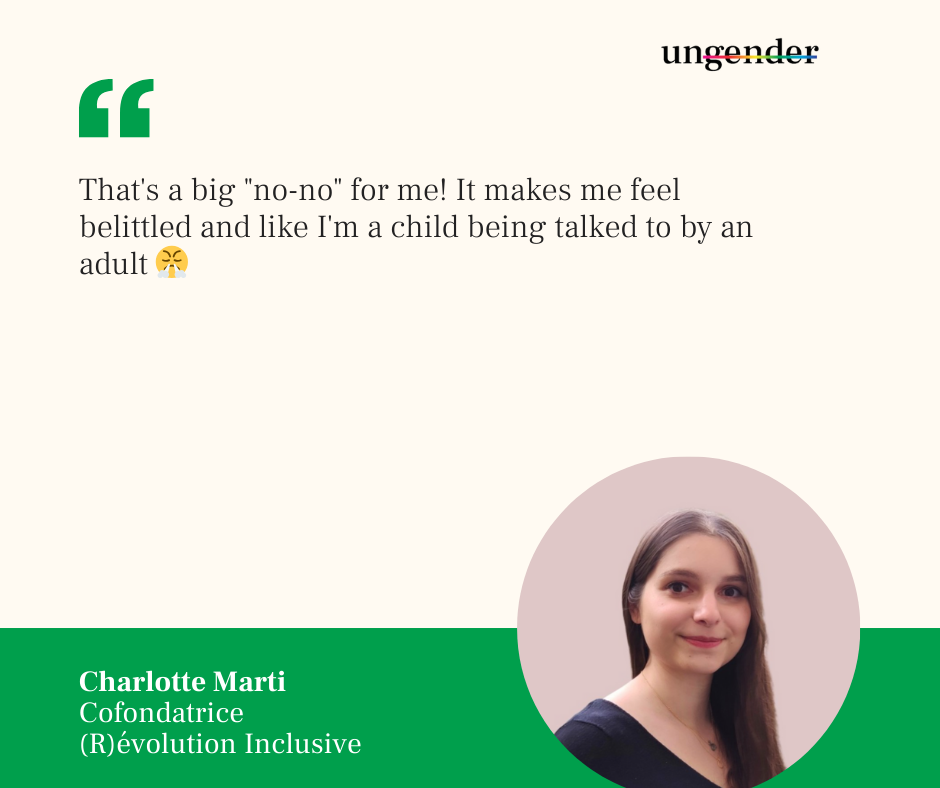Inappropriate Terms of Endearment At The Workplace

As a workplace culture advisor, I frequently encounter the question, “What’s wrong with using words like ‘sweety,’ ‘darling,’ or ‘sweetheart’ if I don’t really mean them?” The issue may seem minor, but it’s important to explore the facts rather than just my opinion.
LinkedIn poll insights:
A recent LinkedIn poll on this topic provided some enlightening feedback. While the poll clearly indicated that many people find these terms inappropriate in the workplace, the sample size was small. However, it highlighted that even among a diverse group, opinions vary, and understanding context is crucial.

Legal perspective and context:
The Calcutta High Court recently addressed this issue, noting that terms like “sweety” or “baby” are not always considered sexual harassment unless used with certain intent or causing workplace discomfort. This emphasizes that context and perception are key in determining the appropriateness of such language.
Exploring different perspectives:
1. Intent matters:
Understanding the intent behind words is tricky because it is invisible and easily misinterpreted. While some might see these terms as harmless, they can be used to disguise inappropriate behaviour. This ambiguity often complicates investigations into workplace complaints.
Comment from LinkedIn User:
Intent is invisible and can be manipulated, making it crucial to focus on how these words are received.
2. Gender lens and power dynamics:
Dr. Deepa highlighted the importance of observing how language is used by those who defend it as their general way of speaking. Often, gender dynamics and power imbalances influence how these terms are received and whether employees feel they can object.
 She also adds,
She also adds,
This is where it becomes imperative that we examine implicit biases. Implicit bias permeates at all levels in the workplace introducing unintentional discrimination. Establishing a personal connection whether it is at a workplace or not, should be treated like consent. It should be discussed and mutually arrived upon terms of relationship. When in doubt or confusion or ambiguity or lack of information, the safest answer is a ‘NO’. Only a clear, conscious, and well-informed “yes” means yes, all other permutation and combinations of answers lead to “NO”. Even at a personal level, consent is crucial to me, so at workplace I do not consent to having personal connections.
Simrita Kaur Takhtar’s Insight: “In workplaces, power dynamics play a crucial role in how language is perceived. Those using terms like ‘sweety’ often rely on their positional power, affinity with the addressed person, or workplace culture.”

Charlotte Marti’s Opinion: “Being addressed with such terms can make many uncomfortable, as it often feels patronizing and undermines professionalism.”

2. Sector-Specific Norms: The acceptability of terms of endearment varies by industry. In creative sectors like media or advertising, casual language might be more accepted, whereas, in formal environments like banking or healthcare, it is often frowned upon.
- UK Case: Mr. Hartley was dismissed for using terms like “sweet” and “love” at work.
- Malaysia: Guidelines prohibit civil servants from using terms like “sayang” or “dear.”
- Canada: A financial firm faced a lawsuit due to a hostile environment created by an executive’s use of endearing terms.
Recommendations for professionals: Fostering a respectful workplace
Creating a respectful and inclusive workplace requires conscious effort and awareness. Here are detailed steps for professionals to ensure their language and behaviour contribute positively to their work environment.
- Assess necessity: Before using terms of endearment or any informal language at work, ask yourself if it is necessary and appropriate for the situation. Reflect on whether such language adds value to the conversation or if it might be perceived as unprofessional or patronizing.
- Consider the context: Understand the context of your interaction. Formal meetings, client interactions, and communications with superiors typically demand professional language.
- Evaluate relationship: Assess the relationship you have with the person you’re addressing. Close colleagues might be more comfortable with informal terms, but it’s always safer to err on the side of professionalism.
- Seek feedback: Regularly check in with your colleagues about their comfort levels with informal language. Open communication can help create a respectful and inclusive work environment.
- Ask directly: Ask colleagues if they are comfortable with certain terms or language styles. A simple, “Is it okay if I call you this?” can go a long way.
- Anonymous surveys: Implement anonymous surveys to gauge overall comfort levels with workplace language without putting individuals on the spot.
- Adapt language: Be ready and willing to adjust your language based on feedback from colleagues. Flexibility and responsiveness show respect for others’ boundaries and preferences.
- Be observant: Pay attention to non-verbal cues. If someone seems uncomfortable, it’s a sign to change your approach.
- Show empathy: Understand that everyone has different comfort levels and backgrounds. Respecting these differences is crucial for a harmonious workplace.
- Speak up: If you find yourself on the receiving end of uncomfortable or inappropriate language, it’s important to express your feelings and set boundaries.
- Be direct but polite: Clearly and respectfully communicate your discomfort. For example, “I prefer to be called by my name instead of terms like ‘sweety.’”
- Seek support: If direct communication doesn’t resolve the issue, don’t hesitate to seek support from HR or a supervisor. They can intervene and guide to ensure a respectful work environment.
- Document incidents: Keep a record of instances where you feel uncomfortable. Documentation can be useful if the issue needs to be escalated.
Conclusion
Promoting a respectful workplace is a collective responsibility. By assessing the necessity of informal language, seeking and responding to feedback, adapting language accordingly, and speaking up when necessary, professionals can contribute to a positive and inclusive work environment. This approach not only fosters mutual respect but also enhances overall workplace harmony and productivity.
Need help in starting this journey? Write to us at contact@ungender.in.
Author: Pallavi Pareek is the Founder and MD of Ungender. Having handled more than 6000 sexual harassment and workplace misconduct cases, she is an expert in the field of workplace sexual harassment laws and in building diverse and inclusive workplaces. Pallavi is also the leading advisor, trainer, consultant, and external member for some of India’s biggest organizations in these matters. Her approach is grounded in research, and she draws upon the latest insights and best practices to inform her work.
Read our insights about diversity, legal updates and industry knowledge on workplace inclusion at Ungender Insights. Visit our Blog.
Sign up to stay up-to-date with our free e-mail newsletter.
The above insights are a product of our learning from our advisory work at Ungender. Our Team specialises in advising workplaces on gender centric laws.
or email us at contact@ungender.in




